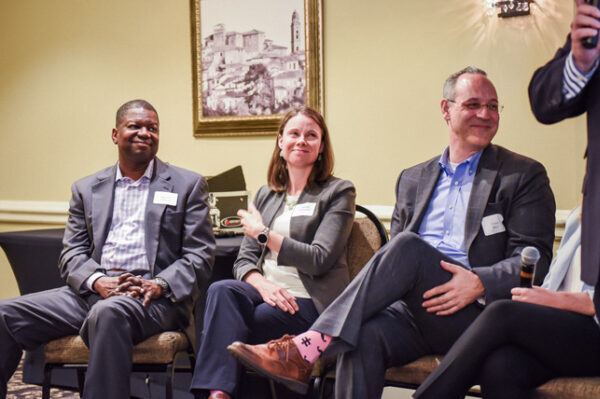
FHLI Programs, Coalitions & Collaboratives
FHLI’s innovative programs advance whole-person health care through community engagement and a team-based approach. Our experienced teams work to improve health in communities across North Carolina and beyond.

Jim Bernstein Health Leadership Fellows
The Jim Bernstein Community Health Leadership Fellows program develops future leaders to work in, and improve the health status of, rural and underserved communities in North Carolina.
The Bernstein Fellows Program identifies and supports the work of outstanding individuals already working in health services and who share Jim’s passion for rural health. When selected, Bernstein Fellows receive:
- Educational opportunities and individual mentoring through a network of professionals associated with FHLI and working in various fields of health and wellness.
- Up to two years of funding to support a project they develop that will improve the health of their community.
After the two-year fellowship, Bernstein Fellows not only have a broader understanding of rural and underserved community needs, but also develop the leadership skills necessary to engage and collaborate with others to improve the health and economic state of their communities.
Download and share this PDF about the current class of Bernstein Fellows.

Jim & Sue Bernstein Health Center Scholarship Program
FHLI founder Dr. Jim Bernstein dedicated his life to improving health and wellness in North Carolina’s rural communities. An innovator and a motivator, he served as a role model in addressing some of the most difficult rural health care challenges.
As a part of Jim’s commitment to improve rural health, he helped to establish a network of 81 community-based clinics and centers across the state. Being involved in the creation of these centers, Jim understood the importance of the contributions made to the community by the clinic staff. In an effort to give back, he and his wife, a former Peace Corps volunteer, began the Jim & Sue Bernstein Health Center Scholarship Program.
Since its inception in 2006, more than $115,000 has been awarded to more than 89 North Carolina scholars.
Selected annually by the Jim Bernstein Health Leadership Committee, these scholarships help to relieve some of the financial burden on the employees of eligible health centers by helping to pay for both the clinical education of rural clinic staff members, and the college education of a dependent in any area of interest.

Center of Excellence for Integrated Care
Too often, services for physical and behavioral health are poorly coordinated, leading to a lack of appropriate care for those suffering from mental illness and substance abuse. This lack of collaboration means primary care providers often must try to address unmet behavioral health needs with insufficient specialty back-up and information.
For more than a decade, FHLI’s Center of Excellence for Integrated Care has been assisting clinics and health systems address this need by providing evidence-based approaches customized to fit local needs, as well as resources for assessment, training, and technical assistance.
Currently, the team works with more than 30 sites and programs, such as primary care offices, clinics and hospitals, community collaboratives, school-based health centers, and local government organizations.

NCCARE360
NCCARE360 is the first statewide network that unites health care and human services organizations with a shared technology that enables a coordinated, community-oriented, person-centered approach for delivering care in North Carolina.
Available in all 100 North Carolina counties, NCCARE360 helps providers electronically connect those with identified needs to community health and human service resources and allow for feedback and follow up. Whether it be connecting someone to a local food pantry, or assisting them with transportation to an employment agency, this solution ensures accountability for all services delivered, provides a “no wrong door” approach, closes the loop on every referral made, and reports outcomes of that connection.

NC Oral Health Collaborative
The NC Oral Health Collaborative convenes diverse stakeholders from across North Carolina to identify and resolve barriers to good oral health, as well as to accelerate the implementation of proven policies and practices.
Members of the collaborative are committed to ensuring that all North Carolinians, regardless of geography, socioeconomic background, race, ethnicity, age, or mental/physical illness have access to quality and affordable dental care.

NC Rural Health Association
Rural communities are unique. And the failure to address the particular strengths and challenges they face can result in poor health outcomes for the people living there. Because of these distinctions, it is important to consider and prioritize the rural perspective when addressing health disparities.
The NC Rural Health Association is a coordinated network of administrative leaders and experienced practitioners representing rural health organizations and individuals. NCRHA strives to improve the health of rural North Carolinians through education and strategic partnerships.

Project ECHO Network in North Carolina
FHLI’s newest program, Results NC was launched in 2023 with the goal of supporting and facilitating community-based Project ECHOs with technical assistance and coordination resources.
Project ECHO programs are available in North Carolina, but there is uneven distribution across the state. Through coordination across regions and subject areas, PEN-NC will help resolve inefficiencies and increase equity in access to Project ECHO content and expertise.
